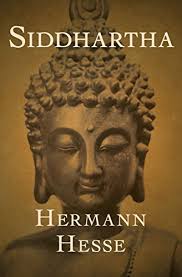Siddhartha Page #15
Siddhartha is a novel by Hermann Hesse that deals with the spiritual journey of self-discovery of a man named Siddhartha during the time of the Gautama Buddha. The book, Hesse's ninth novel, was written in German, in a simple, lyrical style.
Once, he said to her: "You are like me, you are different from most people. You are Kamala, nothing else, and inside of you, there is a peace and refuge, to which you can go at every hour of the day and be at home at yourself, as I can also do. Few people have this, and yet all could have it." "Not all people are smart," said Kamala. "No," said Siddhartha, "that's not the reason why. Kamaswami is just as smart as I, and still has no refuge in himself. Others have it, who are small children with respect to their mind. Most people, Kamala, are like a falling leaf, which is blown and is turning around through the air, and wavers, and tumbles to the ground. But others, a few, are like stars, they go on a fixed course, no wind reaches them, in themselves they have their law and their course. Among all the learned men and Samanas, of which I knew many, there was one of this kind, a perfected one, I'll never be able to forget him. It is that Gotama, the exalted one, who is spreading that teachings. Thousands of followers are listening to his teachings every day, follow his instructions every hour, but they are all falling leaves, not in themselves they have teachings and a law." Kamala looked at him with a smile. "Again, you're talking about him," she said, "again, you're having a Samana's thoughts." Siddhartha said nothing, and they played the game of love, one of the thirty or forty different games Kamala knew. Her body was flexible like that of a jaguar and like the bow of a hunter; he who had learned from her how to make love, was knowledgeable of many forms of lust, many secrets. For a long time, she played with Siddhartha, enticed him, rejected him, forced him, embraced him: enjoyed his masterful skills, until he was defeated and rested exhausted by her side. The courtesan bent over him, took a long look at his face, at his eyes, which had grown tired. "You are the best lover," she said thoughtfully, "I ever saw. You're stronger than others, more supple, more willing. You've learned my art well, Siddhartha. At some time, when I'll be older, I'd want to bear your child. And yet, my dear, you've remained a Samana, and yet you do not love me, you love nobody. Isn't it so?" "It might very well be so," Siddhartha said tiredly. "I am like you. You also do not love--how else could you practise love as a craft? Perhaps, people of our kind can't love. The childlike people can; that's their secret." SANSARA For a long time, Siddhartha had lived the life of the world and of lust, though without being a part of it. His senses, which he had killed off in hot years as a Samana, had awoken again, he had tasted riches, had tasted lust, had tasted power; nevertheless he had still remained in his heart for a long time a Samana; Kamala, being smart, had realized this quite right. It was still the art of thinking, of waiting, of fasting, which guided his life; still the people of the world, the childlike people, had remained alien to him as he was alien to them. Years passed by; surrounded by the good life, Siddhartha hardly felt them fading away. He had become rich, for quite a while he possessed a house of his own and his own servants, and a garden before the city by the river. The people liked him, they came to him, whenever they needed money or advice, but there was nobody close to him, except Kamala. That high, bright state of being awake, which he had experienced that one time at the height of his youth, in those days after Gotama's sermon, after the separation from Govinda, that tense expectation, that proud state of standing alone without teachings and without teachers, that supple willingness to listen to the divine voice in his own heart, had slowly become a memory, had been fleeting; distant and quiet, the holy source murmured, which used to be near, which used to murmur within himself. Nevertheless, many things he had learned from the Samanas, he had learned from Gotama, he had learned from his father the Brahman, had remained within him for a long time afterwards: moderate living, joy of thinking, hours of meditation, secret knowledge of the self, of his eternal entity, which is neither body nor consciousness. Many a part of this he still had, but one part after another had been submerged and had gathered dust. Just as a potter's wheel, once it has been set in motion, will keep on turning for a long time and only slowly lose its vigour and come to a stop, thus Siddhartha's soul had kept on turning the wheel of asceticism, the wheel of thinking, the wheel of differentiation for a long time, still turning, but it turned slowly and hesitantly and was close to coming to a standstill. Slowly, like humidity entering the dying stem of a tree, filling it slowly and making it rot, the world and sloth had entered Siddhartha's soul, slowly it filled his soul, made it heavy, made it tired, put it to sleep. On the other hand, his senses had become alive, there was much they had learned, much they had experienced. Siddhartha had learned to trade, to use his power over people, to enjoy himself with a woman, he had learned to wear beautiful clothes, to give orders to servants, to bathe in perfumed waters. He had learned to eat tenderly and carefully prepared food, even fish, even meat and poultry, spices and sweets, and to drink wine, which causes sloth and forgetfulness. He had learned to play with dice and on a chess-board, to watch dancing girls, to have himself carried about in a sedan-chair, to sleep on a soft bed. But still he had felt different from and superior to the others; always he had watched them with some mockery, some mocking disdain, with the same disdain which a Samana constantly feels for the people of the world. When Kamaswami was ailing, when he was annoyed, when he felt insulted, when he was vexed by his worries as a merchant, Siddhartha had always watched it with mockery. Just slowly and imperceptibly, as the harvest seasons and rainy seasons passed by, his mockery had become more tired, his superiority had become more quiet. Just slowly, among his growing riches, Siddhartha had assumed something of the childlike people's ways for himself, something of their childlikeness and of their fearfulness. And yet, he envied them, envied them just the more, the more similar he became to them. He envied them for the one thing that was missing from him and that they had, the importance they were able to attach to their lives, the amount of passion in their joys and fears, the fearful but sweet happiness of being constantly in love. These people were all of the time in love with themselves, with women, with their children, with honours or money, with plans or hopes. But he did not learn this from them, this out of all things, this joy of a child and this foolishness of a child; he learned from them out of all things the unpleasant ones, which he himself despised. It happened more and more often that, in the morning after having had company the night before, he stayed in bed for a long time, felt unable to think and tired. It happened that he became angry and impatient, when Kamaswami bored him with his worries. It happened that he laughed just too loud, when he lost a game of dice. His face was still smarter and more spiritual than others, but it rarely laughed, and assumed, one after another, those features which are so often found in the faces of rich people, those features of discontent, of sickliness, of ill-humour, of sloth, of a lack of love. Slowly the disease of the soul, which rich people have, grabbed hold of him.
Translation
Translate and read this book in other languages:
Select another language:
- - Select -
- 简体中文 (Chinese - Simplified)
- 繁體中文 (Chinese - Traditional)
- Español (Spanish)
- Esperanto (Esperanto)
- 日本語 (Japanese)
- Português (Portuguese)
- Deutsch (German)
- العربية (Arabic)
- Français (French)
- Русский (Russian)
- ಕನ್ನಡ (Kannada)
- 한국어 (Korean)
- עברית (Hebrew)
- Gaeilge (Irish)
- Українська (Ukrainian)
- اردو (Urdu)
- Magyar (Hungarian)
- मानक हिन्दी (Hindi)
- Indonesia (Indonesian)
- Italiano (Italian)
- தமிழ் (Tamil)
- Türkçe (Turkish)
- తెలుగు (Telugu)
- ภาษาไทย (Thai)
- Tiếng Việt (Vietnamese)
- Čeština (Czech)
- Polski (Polish)
- Bahasa Indonesia (Indonesian)
- Românește (Romanian)
- Nederlands (Dutch)
- Ελληνικά (Greek)
- Latinum (Latin)
- Svenska (Swedish)
- Dansk (Danish)
- Suomi (Finnish)
- فارسی (Persian)
- ייִדיש (Yiddish)
- հայերեն (Armenian)
- Norsk (Norwegian)
- English (English)
Citation
Use the citation below to add this book to your bibliography:
Style:MLAChicagoAPA
"Siddhartha Books." Literature.com. STANDS4 LLC, 2024. Web. 23 Nov. 2024. <https://www.literature.com/book/siddhartha_24>.




Discuss this Siddhartha book with the community:
Report Comment
We're doing our best to make sure our content is useful, accurate and safe.
If by any chance you spot an inappropriate comment while navigating through our website please use this form to let us know, and we'll take care of it shortly.
Attachment
You need to be logged in to favorite.
Log In